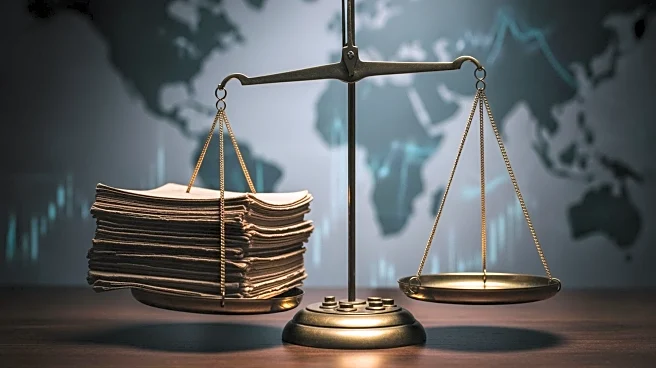What's Happening?
Tim Adams, CEO of the Institute of International Finance (IIF), has emerged as a prominent voice warning about a potential global debt crisis. Adams, who grew up in Kentucky, developed a passion for learning that led him to explore various career paths.
He notably rejected a job offer from Enron in the late 1990s, sensing that the opportunity was too good to be true. Instead, Adams joined George W. Bush's presidential campaign in 1999 and later worked at the U.S. Treasury, where he played a significant role in rebuilding the financial systems of Afghanistan and Iraq post-9/11. His insights into global finance have positioned him as a key figure in discussions about international economic stability.
Why It's Important?
Adams' warnings about a global debt crisis are significant as they highlight potential vulnerabilities in the international financial system. With the U.S. national debt standing at $38.15 trillion and a debt-to-GDP ratio of about 120%, the implications of a global debt crisis could be profound for the U.S. economy. Such a crisis could affect various sectors, including finance, real estate, and consumer spending, potentially leading to increased interest rates and tighter credit conditions. Stakeholders such as policymakers, financial institutions, and businesses must consider these warnings to mitigate risks and ensure economic stability.
What's Next?
The potential for a global debt crisis may prompt policymakers and financial leaders to reassess current economic strategies and debt management practices. Discussions around fiscal policy adjustments, international cooperation, and regulatory measures could become more prevalent as stakeholders seek to prevent or mitigate the impact of such a crisis. The U.S. government and financial institutions may need to explore innovative solutions to manage debt levels and ensure long-term economic resilience.
Beyond the Headlines
Adams' career choices, including his decision to reject Enron and his involvement in rebuilding Afghanistan's financial system, underscore the importance of ethical decision-making and strategic foresight in finance. His experiences highlight the need for transparency and integrity in financial practices, which are crucial for maintaining trust and stability in global markets. The ethical dimensions of financial decision-making could become increasingly relevant as stakeholders navigate complex economic challenges.
















